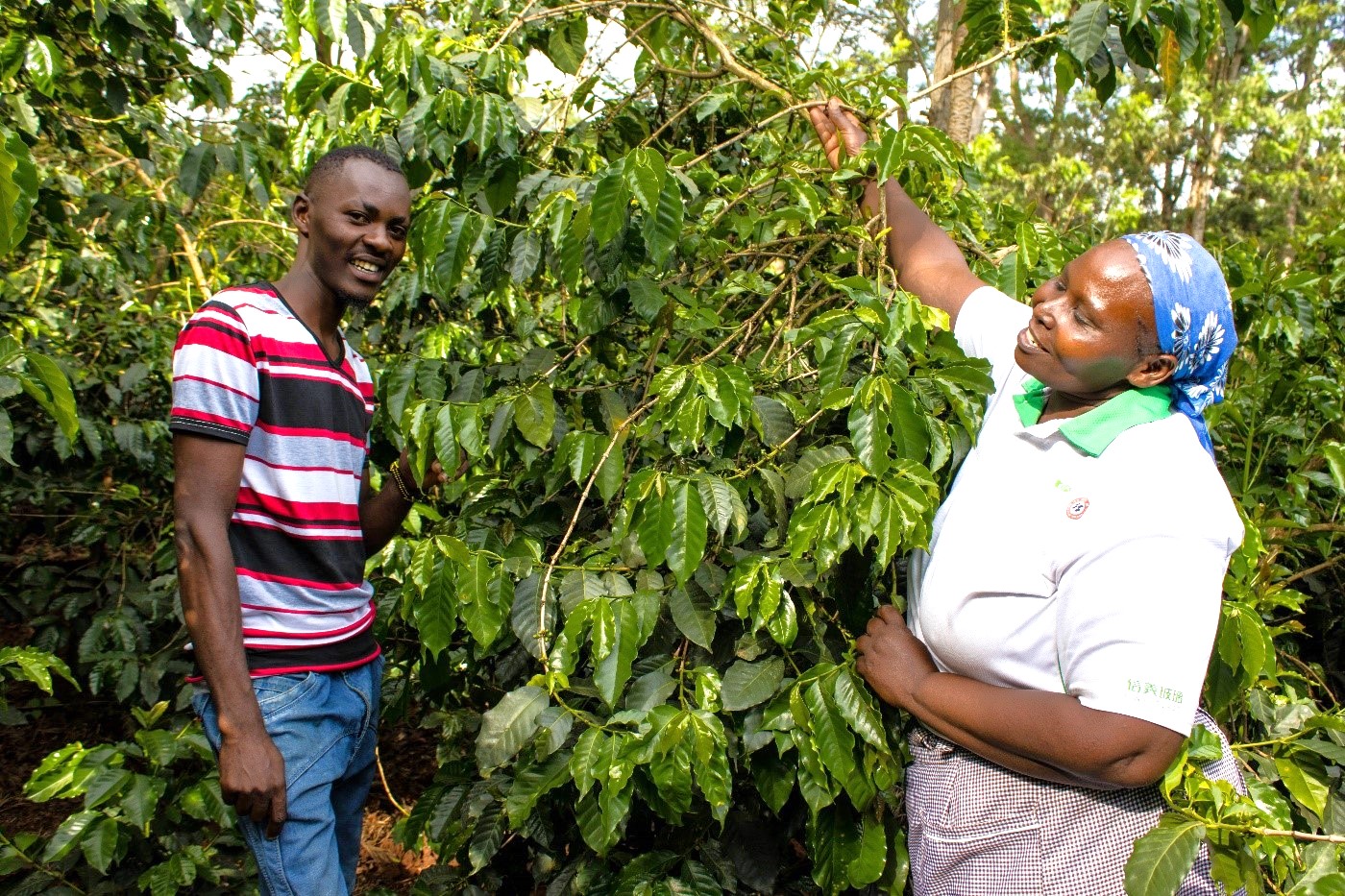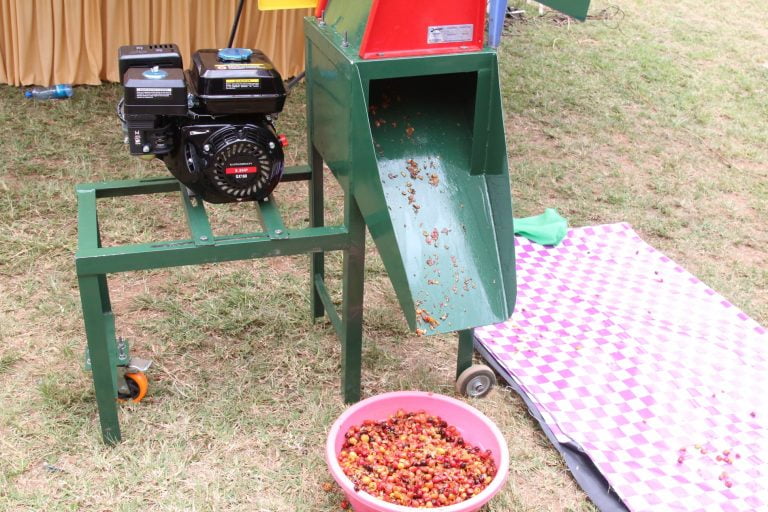By Dr. Boaz Waswa
Adopting regenerative agriculture for coffee presents a new value proposition for the farmers to increase coffee production, productivity and trade, earning farmers income and enabling the country to reposition itself as a leading high quality coffee producer in the world.
Coffee productivity in Kenya has been on the decline, putting over 1.5 million households, majority smallholders, at risk of losing their means of livelihoods. Between 1990 and 2020, Kenya’s acreage under coffee declined by 30%, from 170,000 to 119,000 hectares. Even worse, production dropped by 70%, from 129,00 to 40,000 Metric Tonnes.
The prices of coffee have recently plummeted to as low as Kshs 20 per kilogram of cherry compared to the expected minimum of Kshs. 80 per kg. This has caused an uproar among the farmers, majority of whom are smallholders. The current productivity of coffee averages 475 kilos per hectare compared to 970 kilos per hectare recorded in 1963.
“Majority of our farmers only produce 2 to 3 kilograms of cherry per tree on average, while there is a potential of over 30 kilograms per tree. The productivity is too low to motivate them to engage in coffee production profitably and to compete globally. This has to change,” says James Munyi, the Chairman of Kanjuu Farmers Coffee Cooperative.
The low productivity can be attributed to weak coffee sector systems, weak extension system, declining soil health, poor coffee management, adverse climatic conditions and low global coffee prices against high cost of production.
The Government of Kenya has embarked on plans to revive the coffee sector through various coffee sector structural and market reforms. Beyond these reforms, there is a growing need to also position coffee in the context of global demands and regulations relating to sustainable production, fair trade, healthy and safe diets.
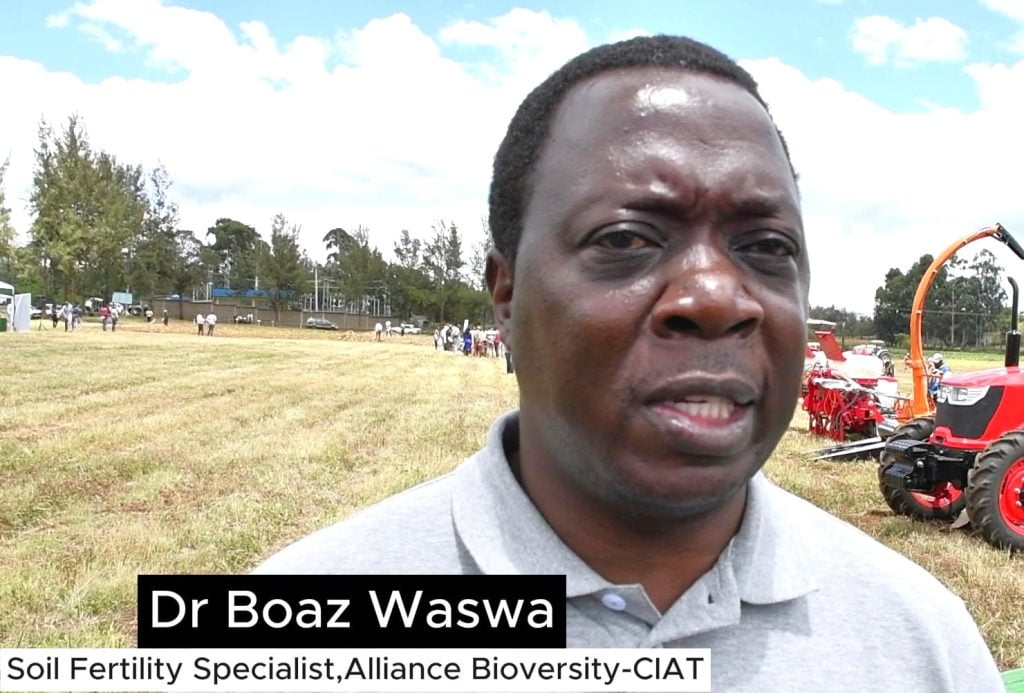
Domestic coffee consumption is at a paltry 3 per cent of national production. That means 97 per cent of the 40,000 metric tonnes Kenya produces is exported, majorly to the European Union.
The EU has set minimal chemical residue levels for all agricultural products. Further, it has set deadlines for countries to produce coffee sustainably and under deforestation free farms. The world over, consumers are demanding and willing to pay a premium price for coffee produced sustainably, organically, and fairly. This demands for the building of traceability mechanisms along the coffee value chain from farm to cup. Fair price organizations demand that coffee should compensate the smallholder farmers at the production hubs fairly. Such regulations could lock out a bulk of Kenya coffee should the sector fail to meet measures towards sustainability.
Smallholder farmers have limited control over global prices of coffee due to their low economies of scale. However, coffee farmers through the cooperatives can tap and benefit from the multibillion-dollar sector by adopting strategies that increase production, productivity and quality of produce presented to the global market. This will require the farmer to have the right variety of coffee for the environment given, make the necessary soil health amendments and nutrition, carry out proper crop and post-harvest management and adopt climate smart production practices.
Increasing the acreage looks like the easiest way to increase coffee production. Unfortunately, agricultural land is currently facing intensive fragmentation due to the rapidly growing human population as well as serious competition with other investments like real estate and urban sprawl. Expansion of area under coffee may trigger deforestation, thus going against the plans of the government to increase the forest cover to 10% by 2030 as part of its strategy to fight climate change as well as putting exports at risk due to the European Deforestation Regulation (EUDR).
Increasing income from coffee can be achieved by farmers growing specialty coffee with desirable characteristics like physical density, vibrant acidity, intense cup profile and distinctive aromatics. This would fetch higher prices than the usual green beans. High quality coffee can be produced by improving variety and agronomic practices.
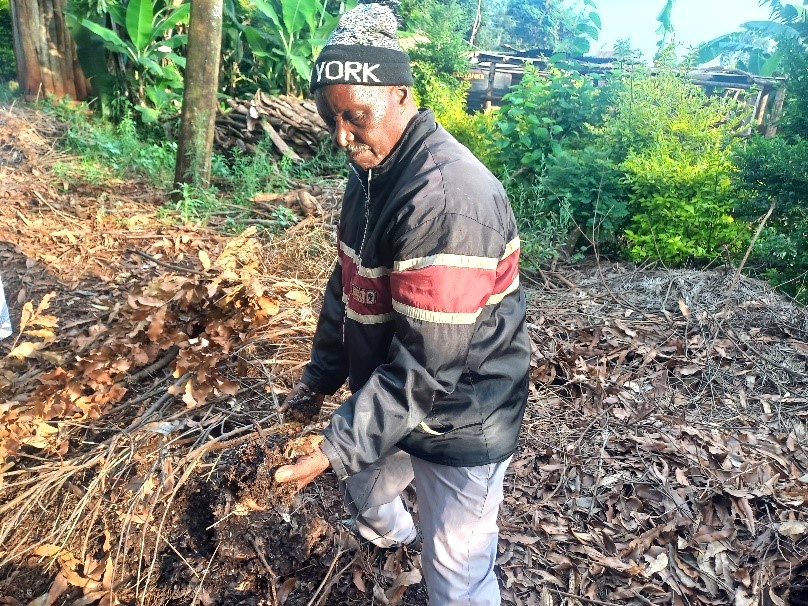
Growing coffee in ways that meets global sustainability standards, and fair trade presents another opportunity for tapping on lucrative coffee markets. This would require that the coffee is produced in a way that sustains the ecosystem health, reduces pollution, reduces chemical use and improves resilience of households to climate change. This is the value proposition presented by encouraging adoption of regenerative agriculture for coffee systems.
Regenerative agriculture focuses on topsoil regeneration, increasing biodiversity, improving the water cycle, supporting carbon sequestration, increasing resilience to climate change, and strengthening soil health. In the context of coffee systems, the resilience is improved through a combination of specific agricultural and post-harvest practices that positively impact the whole coffee farm system: the soil, the coffee plant; the people who cultivate it and the surrounding ecosystems.
The Coffee Farmers Income Resilience Program (CFIRP) supported by the IDH is supporting coffee partners in Kenya and Uganda to achieve sustainability but also higher incomes for the smallholder farmers. Through this project, partners are investing in building capacity of coffee producers to adopt locally adaptable practices that restore and improve soil health as a foundation for sustainability.
Through the support of the Alliance of Bioversity International and CIAT, the project developed a Regenerative Coffee Agriculture Handbook (https://hdl.handle.net/10568/131410 and https://hdl.handle.net/10568/131914) to provide guidelines in implementing Regenerative Agriculture in coffee for Kenya and Uganda.
A recent visit to partner farmers in Kenya revealed effort being made by coffee farmers under Sustainable Management Services (SMS) (https://www.ecomtrading.co.ke/) towards adopting Regenerative Agriculture for Coffee systems. SMS is a leading supply chain, production and quality manager in Kenya supporting over 160,000 small holder coffee farmers across Kenya with best extension and quality education on Good Agricultural Practices (GAPS).
Peter Ndambiri, the Sustainability Supervisor at SMSsays as a coffee marketing company they understand that shifting from conventional agriculture to regenerative agriculture takes time and requires investment. He adds that they are determined to walk with the farmers to achieve sustainability while at the same time better their returns.
“A shift towards regenerative agriculture requires a mind shift among the farmers. We designed a scaling model involving Promoter Farmers, who are trained regenerative agriculture champions who serve as community mobilizers and trainers of farmers around sustainable coffee production practices. Through this approach, we work with 90 Promoter Farmers in Murang’a, Kirinyaga and Tharaka Nithi counties who are supporting over 3,000 farmers along the journey of regenerative coffee agriculture”, says Ndambiri.
In Kirinyaga County, coffee farmers under Kanjuu Farmers Coffee Cooperative have embraced diverse regenerative agriculture practices and are on the path to reaping the benefits. The Cooperative through the support of SMS is supporting farmers to carry out soil testing to determine the soil health and to inform judicious choice and use of inorganic fertilizer. Soil testing helps in ensuring targeted nutrient application thus more efficiency in nutrient use leading to increased coffee productivity while reducing the risk of environmental pollution.
The majority of the farmers in Kirinyaga have embraced the use of compost manure, mulch, cover crops and minimal tillage practices to conserve water and reduce weeds in coffee farms. Those growing coffee on sloppy lands have adopted terraces to reduce runoff that leads to soil erosion. The terraces are reinforced with fodder strips of Napier grass, Brachiaria grass and Calliandra. Other farmers are employing strategies to improve agrobiodiversity in coffee systems by intercropping with beneficial trees, leguminous crop such as beans, tubers such as sweet and Irish potato. Some of the trees integrated in the farms are macadamia, Avocado and Grevillea trees. The nuts and fruit trees, in addition to providing shade, are an extra source of income to the household complementing that from coffee. Some farmers have introduced beneficial insects such as bees to aid with coffee pollination.
Coffee farming is dominated by an aging population. This presents a major challenge of labour and uptake of new knowledge. The youth are the future of coffee production as they are versatile and ready to learn, innovate new farming approaches and apply digital solutions to boost coffee production. The project is thus encouraging the youth in the region to embrace coffee farming as a business.
James Murimi, a youth farmer in Githaraini Village has embraced coffee farming as a business.
“My parents are elderly and so I am helping to manage the coffee farm. I got interested in regenerative agriculture and started producing organic coffee. I set aside 100 stems where I apply a debe of well decomposed manure every season. I strive to reduce use of synthetic inputs and focus more on organic pesticides. I have seen my coffee plants grow healthier, looking greener and with larger berries. I project my coffee productivity will increase from less than 10kg per stem to 20kg per stem”, says Murimi.
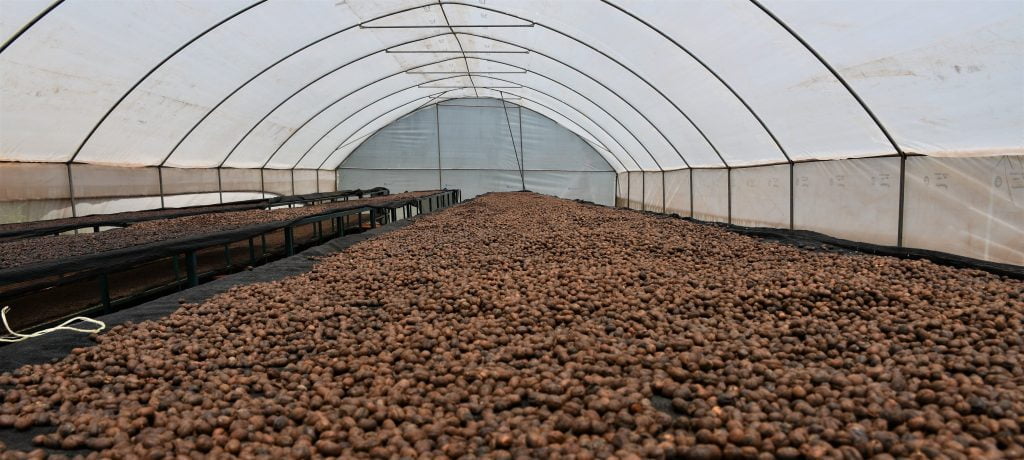
Some coffee farmers spray pesticides up to 10 times per season. This poses the risk of chemical contamination of the final product, the environment and health. To reduce the use of agrochemicals, farmers are embracing the use of cultural practices such as pruning, proper spacing, use of pest tolerant varieties and traps. Others use organic pesticides made from neem, tithonia and Mexican marigold.
“I am replacing SL28 that is susceptible to Coffee Berry Disease (CBD) with Ruiru 11 that is more resistant to this disease as a strategy to reduce chemical use”, opines Rose Wambura, a farmer at Kanjuu Farmers Cooperative Society, Kirinyaga County. Wambura says that there is a need for Kenyans to increase domestic coffee consumption. She prides in processing her own coffee which she happily serves her guests. She adds that coffee farming can be profitable if done well as she has built a house and educated her two children from coffee proceeds.
There are promising cases of farmers shifting towards regenerative coffee production in Kenya. Regenerative agriculture practices for coffee are diverse and context specific. This provides an opportunity to farmers to adopt them step by step, using locally available resources as they grow in knowledge and reap the benefits.
However, adoption of regenerative agriculture in coffee system is knowledge intensive and requires more capacity strengthening and learning among the partners. It also requires a mind shift from conventional coffee production to sustainable practices. Some of the technologies require change of inputs or new financial resources to fully implement regenerative agriculture for coffee. With this comes tradeoffs that need to be considered taking into consideration the farmer typologies, coffee production systems and policy environment.
The actors in the coffee value chain will require incentives to make the shift to regenerative agriculture a reality. A market driven demand for sustainably produced coffee will be a major trigger for adoption of the regenerative interventions by all the coffee sector partners. With this comes the need to develop measurement and monitoring matrices to track changes resulting from the adoption and practice of regenerative agriculture.
Building a traceability and data driven system for actors and processes around regenerative agriculture for coffee will position the sector to comply with the emerging global consumer demand and regulations and tap better returns from the sweet cup of coffee.
Dr. Boaz Waswa is a Senior Scientist working with the Alliance of Bioversity International and CIAT and an Ukama Ustawi (Diversification on East and Southern Africa) work package co-lead. Ukama Ustawi is a CGIAR initiative that is led by the International Water Management Institute (IWMI).


